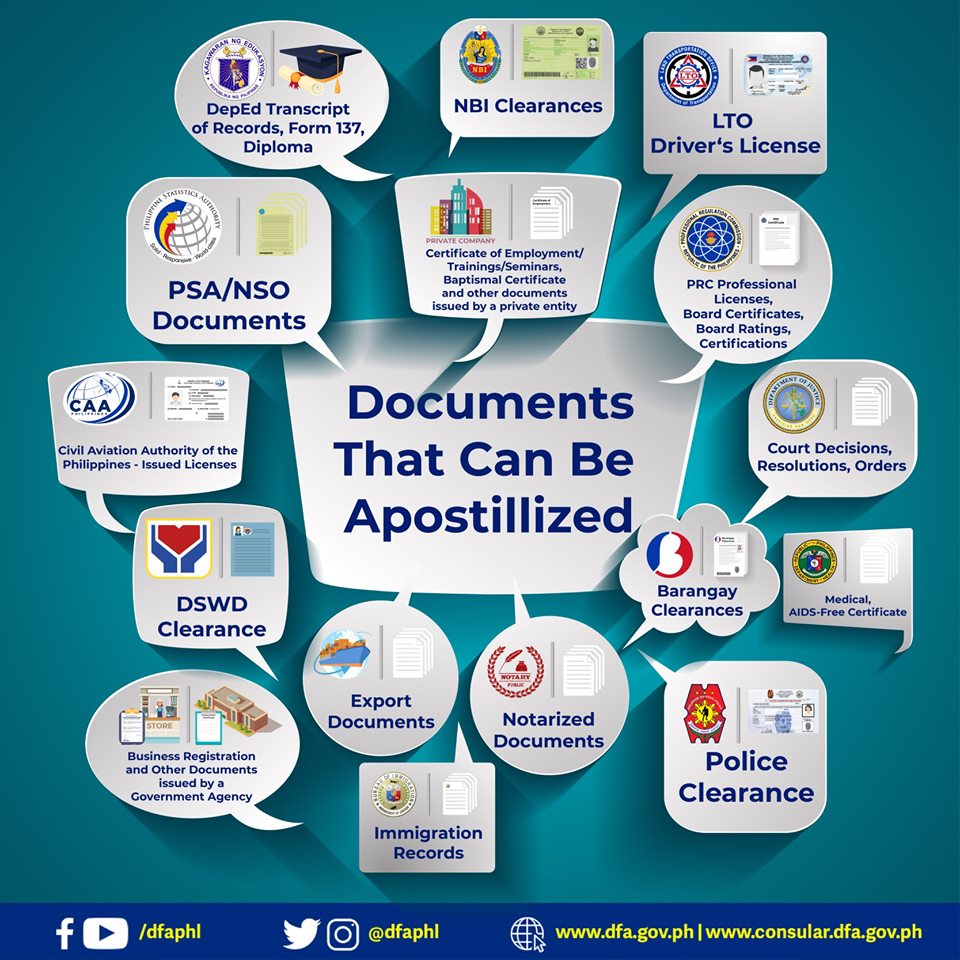DFA replaces ‘red ribbon’ with
‘Apostille’ for authentication
113 countries accept PH apostille
By Susan G. De Leon, PIA
The Department of Foreign Affairs (DFA) no longer issues Authentication Certificates with “red ribbon,” instead an Apostille is now being affixed to documents for use abroad as a proof of authentication.
An Apostille is a certificate that authenticates the origin of a public document. It is issued by a country that is party to the Apostille Convention to be used in another country which is also a party to the Convention.
On May 14, 2019 the Hague Convention Abolishing the Requirement of Legalization for Foreign Public Documents (Apostille Convention) entered into force for the Philippines.
With the Apostille Convention, foreign public documents from Apostille-contracting countries need not be authenticated abroad by Philippine Embassies and Consulates General in order to be recognized and accepted in the Philippines.
In effect, Philippine public documents need not undergo diplomatic or consular authentication in order to be used abroad in fellow Apostille-contracting countries.
There are 113 countries and territories where the Philippine Apostille are now accepted. They are Albania, Andorra, Antigua and Barbuda, Argentina, Armenia, Australia, Azerbaijan, Bahamas, Bahrain, Barbados, Belarus, Belgium, Belize, Bolivia, Bosnia and Herzegovina, Botswana, Brazil, Brunei, Bulgaria, Burundi, Cabo Verde, Chile, Columbia, Cook Islands, Costa Rica, Croatia, Cyprus, Czech Republic, Denmark, Dominica, Dominican Republic, Ecuador, El Salvador, Estonia, Eswatini, Fiji, France, Georgia, Grenada, Guatemala, Guyana, Honduras, Hong Kong, Hungary, Iceland, India, Ireland, Israel, Italy, Japan, Kazakhstan, Kosovo, Kyrgystan, Latvia, Lesotho, Liberia, Liechtenstein, Lithuania, Luxembourg, Macau, Macedonia, Malawi, Malta, Martial Islands, Mauritius, Mexico, Moldova, Monaco, Mongolia, Montenegro, Morocco, Namibia, Netherlands, New Zealand, Nicaragua, Niue, Norway, Oman, Panama, Paraguay, Peru, Poland, Portugal, Romania, Russia, Saint Kitts and Nevis, Saint Lucia, Saint Vincent and the Grenadines, Samoa, San Marino, Sao Tome and Principe, Serbia, Seychelles, Slovakia, Slovenia, South Africa, South Korea, Spain, Suriname, Sweden, Switzerland, Tajikistan, Tonga, Trinidad and Tobago, Tunisia, Turkey, Ukraine, United Kingdom, USA, Uruguay, Uzbekistan, Vanuatu, and Venezuela.
The Apostille Convention only applies if both the country where the public document was issued and the country where the public document is to be used are parties to the Convention The Apostille streamlines the whole authentication procedure of documents for use abroad resulting to more convenience, less cost and processing time for the applicants.
Before Apostille, a Philippine document to be used abroad needs a certification by the relevant government agency or office, authentication by the DFA, and legalization by the Embassy of the country of destination.
With the Apostille, documents will no longer require legalization by the Foreign Embassy if the country or territory of destination is already a member of the Apostille Convention. Once Apostillized by the DFA, the document can be validly used in any and all Apostille Countries.
After authentication (Apostillization) by the DFA, there is no more need for legalization by the Foreign Embassies or Consulates except for countries that have not acceded to the Convention.
Aside from countries that have not yet acceded to the Apostille Convention, the Philippine Apostille will not apply to Austria, Finland, Germany and Greece. Documents from and to such countries will still require legalization by their Embassy or Consulate in the Philippines.
The DFA Office of Consular Affairs will be the competent authority responsible for the implementation of the Apostille Convention. The Supreme Court plays an important role since the accession would require the amendment of certain provisions of the Rules of Court pertaining to the use of foreign public documents. (PIA InfoComm/DFA)














